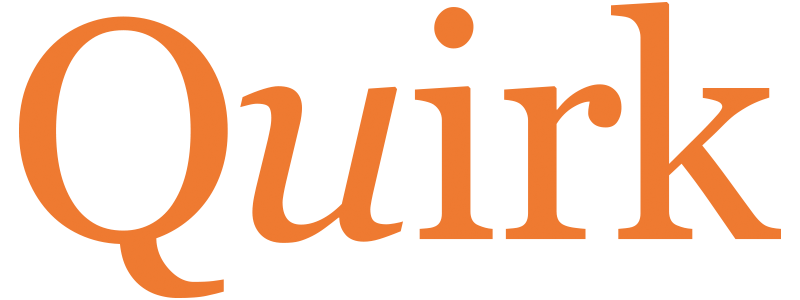Listen to Chris Paton, Managing Director of Quirk Solutions as he joins business podcast co-hosts Jim Vaselopulos and Jan Rutherford of The Leadership Podcast for a discussion on the merits of business wargaming as an essential tool to mitigate risks and maximise success.
On this business leadership podcast, they discuss how the process works and why it’s becoming one of the leading strategy testing methods in business across the globe.
Studies show that having a sense of purpose is increasingly what drives us to work. Building a culture of trust is one way to create that feeling for people. When the stakes are high, we need to trust the people we work with.
I was recently invited by Rachael Wilson, MD of the EW Group to be a guest on Reworked, their podcast on workplace culture. In the podcast, Rachael and I get into a discussion about the importance of trust in managing teams at work.
Listen to the podcast:
Learn more about The EW Group
The following are highlights from the Podcast:
Rachael: It’s important to our sense of identity that we work well and have meaningful experiences so that we can contribute to the world. Studies show that having a sense of purpose is increasingly what drives us to work. Building a culture of trust is one way to create that feeling for people.
Chris: The the way in which trust works in the military context is very different. It might be a benchmark for organisations and commercial organisations but at the moment I feel it is quite different. In that you don’t have time in a military setting to take the length of time needed to build trust and build confidence because some people can come into your organisation and very quickly they are responsible for things that could have catastrophic consequences. So the only way in which you can really operate trust in the military context is to give trust automatically. And so instead of working with people, seeing how they perform, building up a level of trust with them, you give it automatically. It’s almost theirs to lose rather than having to build it up. And I certainly think in particular the Royal Marines have an approach to it that is quite inclusive.
So, everybody that is in the Royal Marines, to become a Royal Marine you have to pass a commando course and then you get to wear your green beret. There is obviously a little bit of an element where you start to look at yourself then as somebody who’s done something quite important. And some people get a little bit inflated around the ego, should we say. But the nice thing that I saw within the Royal Marines was that if you have attached people coming in to work with you, so for certain operations you would have people coming from different walks of life within the Armed Forces coming to support you. Because the Royal Marines are so small at just over 3% of defence, it’s tiny. So you need other specialists to come in and help you. Many of those coming in could have a different gender or belief.
The approach that I saw most Royal Marines take was as long as I can trust you to do the job that I understand and you do it and you do well, I don’t really care where you’re from, I don’t really care what your background is, I don’t really care what your gender is. What I care about is that I can switch off and forget about that particular aspect of this operation because you are looking after it. The point at which you lose that inclusivity, you lose that trust, is when the individual then doesn’t perform as they are meant to. So it is that sense of trust being given automatically and then it’s yours to lose if you let people down.
Rachael: Trust is not given to everybody, it’s given to a small number of people. There is a mismatch between the military environment and the working cultures in that we see people in business are very cautious about who they trust, who they take a risk on.
Chris: I don’t think that trust automatically leads to recognition. I think in the business context people forget to say well done. They forget to say to a team that they’ve done a great job and they deserve some praise. You trust them to do it, they do it, but then nothing else really happens and it actually takes effort and discipline to remember to recognise good performance and it’s something then that I think if you’re not careful if you don’t do that recognition, that that starts to damage the trust because people feel why my working so hard to do such a good job, I know I’ve done a good job and now nothing is coming back at me, what’s the point almost. I think there is definitely an element there where I wouldn’t say that recognition automatically follows from trust and that rewards automatically follows from recognition.
There is a system that the military use which has been adapted and evolved to a commercial setting and is used by the Royal mail. The Royal Mail call it freedom within a framework. The military call it mission command. And what that means is that I don’t tell somebody what to do, when to do it, how to do it, and I know that sounds really counterintuitive for the military…. You say what you are looking to achieve, you say what you are aiming for and when you’re talking to your team. What you then do is you give them a sense of the style in which you are going to try and achieve that. Is it going to be high risk, low risk, is it going to be working with external agencies or not. So they got a feel for how this is meant to go. What you then do as you start to give them parts to play within that framework but you again don’t tell them what to do, you don’t give them specific bespoke instructions, what you then do is give them a box within which they are free to operate. So you set if you like a framework around them, a series of constraints if you will, and those could be financial, contractual or you can go and talk to outside agencies or anything else like that. And then you allow those individuals to operate with freedom within that box that you’ve given them. The beauty of that is that you control the level of risk because this mistakes that they might make are only ever going to happen within the box that you set and the box that you have set is your level of risk tolerance. So yes you are giving people trust, yes you are handing over a degree of freedom to individuals but you’ve done it in a framework that makes sense to them, has a few boundaries and therefore won’t necessarily go completely out of control and cause chaos.
Rachael: By setting those boundaries, you are setting them up to succeed.
Chris: Yes, because you are going to get them to come back to you after you describe the boundaries and describe what you want, I’ll give you two hours, two days, two weeks. Come back to me and tell me how you are going to achieve your part of my plan within the freedoms that I’ve given you. And that now allows you to either listen to it and think they didn’t quite understand what I told them in the first place, they’ve got a slightly, subtly, skewed view of what I’ve asked them to do, so you can close that loop of communication, you can go back to them and say, I think you might be slightly out of kilter here. It also allows you if you’ve better experience or knowledge or expertise in that particular area to turn round to somebody is coming back to you briefing you, I get what you are saying but actually with my knowledge and expertise there might be a better way to do it, so you’re coming into a coaching or mentoring relationship. So now they feel even more involved and even more trusted because you’ve invested them with some freedom within a set of boundaries, you allow them to come back and talk to you, and you are now giving your thoughts on their plan and helping them to improve their plan. And that relationship building peace. So yes it’s a level of automatic trust but it’s kind of done in a controlled manner, if you like, within the military.
Rachael: Some are going to have a more prominent role in the team, how does that help or hinder the trust relationship?
Chris: I think it’s about how you set up the task that you’re giving the individuals. Whenever I’m talking to organisations about their strategy or their planning, I will always insist that a come up with two or three different ways in which they could achieve their objectives. Because the tenancy is that we do a bit of analysis, we look at what the problem is, we look at what then we’re trying to achieve and then we just plan. But if you force yourself to take a little step back at that point and say, hang on a minute, there must be other ways in which I can do this, you start to increase your analysis of how you could go about things and the different options that might be in place. It starts to throw up different ideas. This is where you start to get creative and innovative. If you do stay within one set of tramlines you are not going to really be that creative. But if you start to try and look at other options and other ways of doing your plan, delivering to those objectives, you start to have to think creatively. What you can do then is almost put together cross-functional teams to each of those different options. So you deliberately create a set of teams whereby they have somebody from finance, from operations, from marketing, somebody from production or logistics or whatever else it is in that team. So the teams are now being forced to look at ways to deliver to the objectives but are also being forced to talk to each other. And so this now starts to increase the levels of trust because they start to understand what the different departments do. Up until that point in time if you don’t do that approach, all you are doing is you stay in your tramlines, you come to a plan, everybody gets told, operations you’re doing this, logistics are doing that, marketing doing that and they don’t understand what they are meant to be doing and what’s happening in parallel to them.
Rachael: The danger of working within a framework is that you create little silos for everybody and not cross-collaborate with other teams.
Chris: By understanding the difficulties other people have in their day-to-day roles, in different departments, somebody can start to build up a greater level of trust. And it starts to become more inclusive because you realise how difficult it is for finance, they can’t simply just click their figures and produce figures. You realise that actually, logistics need time to put in place all of these things that you are asking them to do. But you might not necessarily understand that in advance and if you don’t do it you become critical of them because they are taking so long and it gets frustrating and trust breaks down. So it’s about that communal understanding within the business of who does what, why they do it, what they can bring to the table and that then means it doesn’t really matter what the prominence of that individual is, because everybody has a vote, everybody has input. Yes, one member of the team might have a slightly different profile to the others but they are relying on other people’s input.
Rachael: How does recognition of contribution affect the trust relationship?
Chris: The quickest way to destroy any team is to praise certain individuals within it but not everybody or just to praise the whole team. If you are going to pick out certain individuals because they have done something well, you need to pick out everybody or you need to work with the whole team, the coherent mass. I prefer the latter approach, I prefer to treat the team as a team, rather than picking out individuals because I find that that drives the team to become closer knit.
Rachael: How do leaders respond under stress and how that affects trust?
Chris: Everybody is different. Different people respond to different types of stress in different ways. The first thing is to really understand who is apt to what type of situation and using people in the best way, so that you using the right people, in the right places, at the right times to deliver the outcomes that you are looking for. It’s also about shifting your leadership approach then. If you are a subtle leader then what you are looking to do is increase your level of engagement and activity when the timeframe a short and things need to be dealt with and you are backing off and giving the team that freedom within a framework when you’ve got the latitude to do so. So it’s a sliding scale and understanding where you should be on that sliding scale and the type of leadership that you are going to exhibit according to the situation, that is a real part of how you deal with a trust issue within people because they will understand, well actually he has been really directive at this point in time or she is, and I understand why they are doing that and I’m fine with it because I know that normally when things aren’t this hectic they allow me my own space.
Authenticity and trust
Chris: We’ve all been in situations where you know that somebody is putting on a facade. You can tell very quickly when somebody is deeply uncomfortable and is masking it with a particular leadership style and they become inauthentic. As soon as that happens you lose trust. The commercial world, from what I have seen, find it very difficult to turn around and say as leaders I don’t know everything that is going on and I need you the people in my organisation, right down as a vertical slice to the lowest levels, to help me understand what is going on so I can make better decisions. The military prize that approach because they see that the great strengths, they see it as being very inclusive because now no matter what level you are at you have a seat at the table and you feel like you have a vote because you are able and you are valued in your contribution. If you don’t do that, if you try and do the normal commercial model of “obviously because I am the leader I know everything there is to know about this business, this model, this sector. I cannot be challenged on anything and therefore I am going to make the following decisions”. People end up sitting there being ‘Well now you’re making a massive mistake and I know you’re making a mistake because I understand more about that situation then you do but I do not now have the authority to come back and say why are we doing it like this’. So enabling that culture where you allow people to have that imput is really important and that’s where the wargaming piece comes in. It’s a stepping stone that allows senior leaders who aren’t used to allowing a degree of dissent and challenge, for it to happen in a safe environment that they can control. It doesn’t open Pandora’s box and suddenly everybody is criticising everything and it’s all gone to chaos.
People need to feel they have the opportunity to come back and ask questions. That’s the way then that they understand the task that they’ve been given. If all you do is tell someone what to do, you’ve got no guarantee that they’ve actually understood it in the way that you expressed it.
Rachael: Closed loop communication – People will say they don’t have time to implement Freedom with a framework, don’t have time to practise closed-loop communication and checking people have understood.
Chris: My challenge back to them would be what is the consequence of not doing it? It’s that people don’t understand what they’ve meant to have done and now they go off doing their very best to deliver something they think you’ve asked them to do. Two months down the line, three months down the line, you turn around and say why on earth are we miles off? And it’s not because the individual is being deliberately difficult, it’s because they’ve been working their hardest. You now turn around to them and say you’re an idiot, why have you been doing all of this, why aren’t you over here and that just demoralises that person because they’ve been working their very hardest to deliver what they’ve been asked to deliver. You now as an organisation have to backtrack from the position you found yourself in, which costs you money or you are going to have to crisis manage the problem that you’ve landed yourselves with. And that crisis management and the cost of doing it is nearly always far more significant than the small amount of time and effort taken to do closed-loop communication in the first place.
It doesn’t have to be something that you go down through the whole organisation if you’re in quite a large organisation, if you’re in a large corporate with lots of levels. Each level can do that check themselves. As long as each level is checking then cumulatively the checks all add up to where you need to get to. It doesn’t take an awful lot of time but it does deliver a huge amount of difference.
Rachael: What tips have you for leaders on where they might focus that checking?
Chris: If they want to try and bring this type of technique in then they want to start doing it with non-controversial type subjects. So pick a really easy, small project or type of initiative that you want to go into and start to bring it in. If you bring it in right on top of quite a testing, difficult, challenging, high friction problem that the whole organisation is really anxious about, people are going to be resistant to that change. So you definitely want to bring it in gradually. What areas of the business should they focus on? Well, unfortunately, it depends on the situation that the businesses in, the sector that the business is in, and what problems they are facing. For some that want to focus on reputational protection because that is all important to them. For others, it might be that they want to focus on budget and Finance because they’ve not proved themselves to be particularly disciplined in the past. So it doesn’t really matter, it’s appropriate to the focus of the business at the time that it feels it needs to address.
Rachael: Closed loop communication – It’s a dialogue and a dialogue means that both people are involved.
Chris: Feeling listened to, builds trust. The most powerful thing you could do as any leader or any person frankly in any given situation is to make people feel like you are engaged with them. That you are looking at them, that you are listening to them, that you are listening to what they are saying. You are not just listening waiting to respond, you are listening to understand so that you can come back with something based on what they’ve said. Whenever people feel like that and they are part of that conversation, now they start to feel invested in and therefore the trust starts to build.



